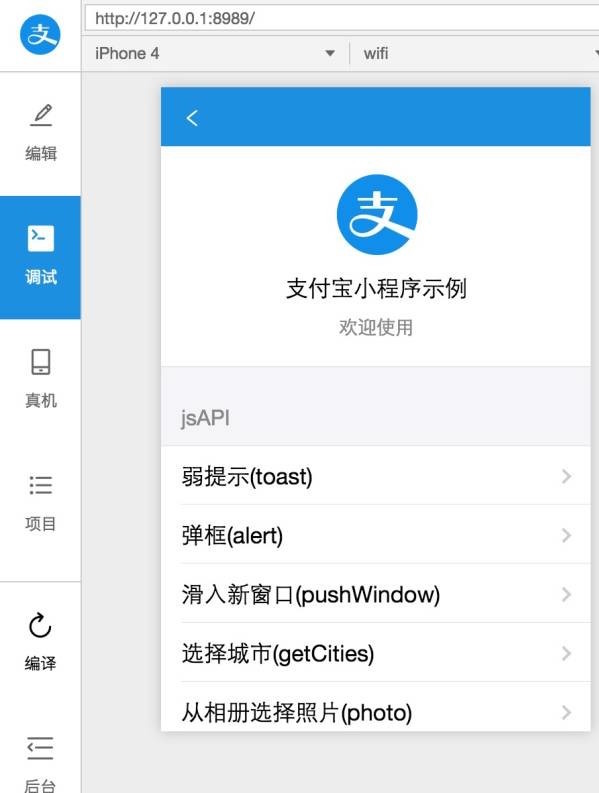 WeChat Applet
WeChat Applet
 Mini Program Development
Mini Program Development
 Following the WeChat mini program, the Alipay mini program is also here!
Following the WeChat mini program, the Alipay mini program is also here!
Following the WeChat mini program, the Alipay mini program is also here!
At the WeChat open class held on December 28, Zhang Xiaolong, vice president of Tencent and the father of WeChat, announced that the WeChat applet is planned to be launched on January 9, 2017. The WeChat applet will be able to be up to 1MB (1024KB) in the future, and can be scanned through WeChat When launched using a QR code, WeChat will optimize the bottom layer of the application to ensure the smoothness of the mini program.
For Ali, who has always had a social dream, adding various social elements to the Alipay APP has always been the current core. Although a series of attempts have been made, since the "Pay Bustard" incident some time ago, We can see Alibaba’s social ambitions. After Tencent took action, Alipay was unwilling to lag behind others. Recently, many screenshots of Alipay’s mini program developer tool page have appeared on the Internet. Judging from the screenshots, Alipay’s new developer-oriented platform is also named “Mini Program”. This section belongs to the Ant Financial system and still uses traditional front-end development technology.

Alipay officially stated that they began to develop applications similar to mini programs in September last year, which was more than half a year later than when WeChat first proposed mini programs. Although it lags behind, the experience may not be worse than WeChat mini programs. Alibaba itself With Weex as the basis, Weex announced that it was open source in April 2016. In less than a year, the number of Github stars has exceeded 10,000. With slight modifications, it can be directly applied to the current "mini program" , the experience and completion should be much higher than the WeChat mini program. At the same time, Alipay can make better use of its accumulated third-party payment scenarios for frequently used services (such as KFC and McDonald's, hotel reservations, restaurant reservations, ordering and checkout, parking by appointment).
What do you think of Alipay’s launch of “小program”?
Seeing this risky move, Alipay is about to take a successful step in building a closed business loop on WeChat. How can it not Create your own business closed loop?If you don’t do it, Alipay will die.Zhang Xiaolong has made it very clear that in the future, the entrance to these mini programs will not be on WeChat, WeChat will be" Tools" to decentralize. He believes that the real world is the entrance to small programs, such as the QR code for ticket booking advertisements in subway stations. Scan WeChat and a small program will appear to quickly realize what users want to do.What Zhang Xiaolong wants to build is an AR world. Alipay actually has such ambitions, and you can see some clues by scanning the VR of the latest Alipay client update.
# Infinitely possible future. Only by combining the virtual and the real can we achieve long-term development. Alipay cannot but do it, must do it, and do it better to achieve its own closed loop. The name of the specific program is another matter, Now ’s Alipay can still take the initiative, but Weibo has completely collapsed on the sofa, Baidu has gone straight to artificial intelligence without looking back, and NetEase is still working hard to develop high-quality apps. , this is the pattern. This is awareness.

Some of the author’s views on WeChat and Alipay launching mini programs
Alipay is still slightly better than WeChat in terms of payment. Alipay is still a bit better than WeChat, but Alipay is at the forefront of social networking, time and time again The failure of Ali still does not allow Ali to see clearly its trump card of payment. WeChat can do payment, and it can indeed take away a piece of Ali’s cake, but WeChat’s payment service is not on the first-level menu, and it cannot be placed At the first level, WeChat is a communication software after all. Even on a mobile phone, the default interface when opening WeChat is your message, and payment is not convenient and fast. However, Alipay itself is positioned as a payment tool. The very obvious payment QR code button on the first screen does not seem obtrusive to users. Similarly, after Alipay is launched on the watch, the payment QR code is directly displayed, which is very convenient. Moreover, Alipay allows users to define shortcut entrances, and the functions are clearer than WeChat. When combined with mini programs, users can naturally put more commonly used services that do not want to install separate apps on the home screen for quick startup. So in terms of practicality, I think Alipay will be stronger than WeChat. WeChat just brought a group of users simply by relying on the number and stickiness of users. Although it is currently impossible to abandon either WeChat or Alipay, Alipay still has great hope of making a comeback. From the product level, small programs are the work of the system and can easily become cannon fodder.
Whether it is a small program or a hot patch, the final reason is that the system is not good enough. It's great that application manufacturers are on the front line (especially large manufacturers) who discover and come up with solutions before the system does, but system manufacturers, no matter what the reason, must have some motivation after discovery, and things will always develop towards the better. The level of development is nothing more than the development of the system.Of course, it is also possible that at the system level, the existing system has been abandoned and focused on higher-dimensional iterations (such as the future of AI/the future of the Internet of Things: Google Fuchsia, Android Things) , But in any case, the two small programs can only be regarded as a painful and helpless alternative to the Instant App that Google has not yet officially launched.

Hot AI Tools

Undresser.AI Undress
AI-powered app for creating realistic nude photos

AI Clothes Remover
Online AI tool for removing clothes from photos.

Undress AI Tool
Undress images for free

Clothoff.io
AI clothes remover

Video Face Swap
Swap faces in any video effortlessly with our completely free AI face swap tool!

Hot Article

Hot Tools

Notepad++7.3.1
Easy-to-use and free code editor

SublimeText3 Chinese version
Chinese version, very easy to use

Zend Studio 13.0.1
Powerful PHP integrated development environment

Dreamweaver CS6
Visual web development tools

SublimeText3 Mac version
God-level code editing software (SublimeText3)

Hot Topics
 1386
1386
 52
52
 Alipay PHP SDK transfer error: How to solve the problem of 'Cannot declare class SignData'?
Apr 01, 2025 am 07:21 AM
Alipay PHP SDK transfer error: How to solve the problem of 'Cannot declare class SignData'?
Apr 01, 2025 am 07:21 AM
Alipay PHP...
 gateio Chinese official website gate.io trading platform website
Feb 21, 2025 pm 03:06 PM
gateio Chinese official website gate.io trading platform website
Feb 21, 2025 pm 03:06 PM
Gate.io, a leading cryptocurrency trading platform founded in 2013, provides Chinese users with a complete official Chinese website. The website provides a wide range of services, including spot trading, futures trading and lending, and provides special features such as Chinese interface, rich resources and community support.
 How to solve the problem of 'Undefined array key 'sign'' error when calling Alipay EasySDK using PHP?
Mar 31, 2025 pm 11:51 PM
How to solve the problem of 'Undefined array key 'sign'' error when calling Alipay EasySDK using PHP?
Mar 31, 2025 pm 11:51 PM
Problem Description When calling Alipay EasySDK using PHP, after filling in the parameters according to the official code, an error message was reported during operation: "Undefined...
 gateio exchange app old version gateio exchange app old version download channel
Mar 04, 2025 pm 11:36 PM
gateio exchange app old version gateio exchange app old version download channel
Mar 04, 2025 pm 11:36 PM
Gateio Exchange app download channels for old versions, covering official, third-party application markets, forum communities and other channels. It also provides download precautions to help you easily obtain old versions and solve the problems of discomfort in using new versions or device compatibility.
 Ouyi Exchange app domestic download tutorial
Mar 21, 2025 pm 05:42 PM
Ouyi Exchange app domestic download tutorial
Mar 21, 2025 pm 05:42 PM
This article provides a detailed guide to safe download of Ouyi OKX App in China. Due to restrictions on domestic app stores, users are advised to download the App through the official website of Ouyi OKX, or use the QR code provided by the official website to scan and download. During the download process, be sure to verify the official website address, check the application permissions, perform a security scan after installation, and enable two-factor verification. During use, please abide by local laws and regulations, use a safe network environment, protect account security, be vigilant against fraud, and invest rationally. This article is for reference only and does not constitute investment advice. Digital asset transactions are at your own risk.
 Sesame Open Door Login Registration Entrance gate.io Exchange Registration Official Website Entrance
Mar 04, 2025 pm 04:51 PM
Sesame Open Door Login Registration Entrance gate.io Exchange Registration Official Website Entrance
Mar 04, 2025 pm 04:51 PM
Gate.io (Sesame Open Door) is the world's leading cryptocurrency trading platform. This article provides a complete tutorial on spot trading of Gate.io. The tutorial covers steps such as account registration and login, KYC certification, fiat currency and digital currency recharge, trading pair selection, limit/market transaction orders, and orders and transaction records viewing, helping you quickly get started on the Gate.io platform for cryptocurrency trading. Whether a beginner or a veteran, you can benefit from this tutorial and easily master the Gate.io trading skills.
 The difference between H5 and mini-programs and APPs
Apr 06, 2025 am 10:42 AM
The difference between H5 and mini-programs and APPs
Apr 06, 2025 am 10:42 AM
H5. The main difference between mini programs and APP is: technical architecture: H5 is based on web technology, and mini programs and APP are independent applications. Experience and functions: H5 is light and easy to use, with limited functions; mini programs are lightweight and have good interactiveness; APPs are powerful and have smooth experience. Compatibility: H5 is cross-platform compatible, applets and APPs are restricted by the platform. Development cost: H5 has low development cost, medium mini programs, and highest APP. Applicable scenarios: H5 is suitable for information display, applets are suitable for lightweight applications, and APPs are suitable for complex functions.
 What should I do if the company's security software conflicts with applications? How to troubleshoot HUES security software causes common software to fail to open?
Apr 01, 2025 pm 10:48 PM
What should I do if the company's security software conflicts with applications? How to troubleshoot HUES security software causes common software to fail to open?
Apr 01, 2025 pm 10:48 PM
Compatibility issues and troubleshooting methods for company security software and application. Many companies will install security software in order to ensure intranet security. However, security software sometimes...



